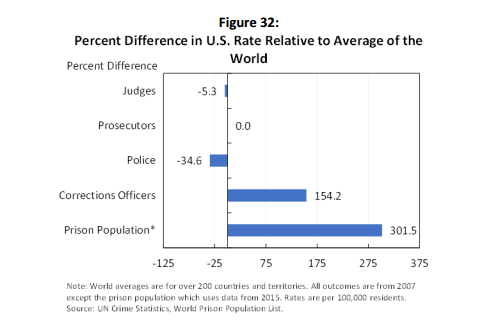Paul Krugman has a long post on this question, here is part of his bottom line:
…the Democratic Party…[is] a coalition of teachers’ unions, trial lawyers, birth control advocates, wonkish (not, not “monkish” — down, spell check, down!) economists, etc., often finding common ground but by no means guaranteed to fall in line. The Republican Party, on the other hand, has generally been monolithic, with an orthodoxy nobody dares question. Or at least nobody until you-know-who…
My view is not so far from that, but I would put it a little differently and then push harder on some other dimensions of the distinction (btw Brad DeLong comments). The Republican Party is held together by the core premise that the status of some traditionally important groups be supported and indeed extended. That would include “white male producers,” but not only. You could add soldiers, Christians (many but not all kinds), married mothers, gun owners, and other groups to that list.
(The success of Trump by the way is that he appeals to that revaluation of values directly, and bypasses or revises or ignores a lot of the associated policy positions. That is why the Republican Party finds it so hard to counter him and also fears it will lose its privileged position, were Trump to win. The older Republican policy positions haven’t delivered much to people for quite some time.)
Democrats are a looser coalition of interest groups. They agree less on exactly which groups should rise in status, or why, but they share a skepticism about the Republican program for status allocation, leading many Democrats to dislike the Republicans themselves and to feel superior to them. In any case, that underlying diversity does mean fewer litmus tests and potentially a much broader political base, as we observe in higher turnout Presidential elections, which Democrats are more likely to win these days. That also means more room for intellectual flexibility, although in some historical eras this operates as a negative.
Right off the bat, this distinction between the two parties puts most blacks, single women, and most but not all Hispanics in the Democratic camp. Not-yet-assimilated immigrants have a hard time going Republican, even though a lot of high-achieving Asians might seem like natural conservatives. No matter how much Republicans talk about broadening their message, the core point is still “we want to raise the status of groups which you don’t belong to!” That’s a tough sell, and furthermore the Republicans can fall all too readily into the roles of being oppressors, or at least talking like oppressors.
Republicans, who are focused on the status of some core groups at the exclusion of others, are more likely to lack empathy. Democrats, who oppose some of the previously existing status relations, and who deeply oppose the Republican ideology, are more likely to exhibit neuroticism.
It is easy for Republicans to see the higher neuroticism of Democrats, and easier for Democrats to see the lesser empathy of Republicans. It is harder for each side to see its own flaws, or to see how the other side recognizes its flaws so accurately.
Academics are one of the interest groups courted by Democrats. Academics want to appear high status and reasonable, and Democrats offer academics some of those features in the affiliation, including the option to feel they are better than Republicans. So on issues such as evolution vs. creationism (but not only), Democrats truly are more reasonable and more scientific. Academics consume those status goods, plus the academics already had some natural tendencies toward neuroticism.
Academics shouldn’t feel too good about this bargain. They are being “used” as all party interest groups are, and how much reasonableness they can consume in the Democratic coalition will ebb and flow with objective conditions. In the 1970s and 1980s, for instance, it was common for Democrats to be more delusional than Republicans, and those days may someday return, though not this year.
Next, we must move beyond the federal level to understand the two parties, and that is also a good litmus test for whether a discussion of the two parties is probing as opposed to self-comforting.
At the state and local level, the governments controlled by Republicans tend to be better run, sometimes much better run, than those controlled by the Democrats (oops). And a big piece of how American people actually experience government comes at the state and local level.
This superior performance stems from at least two factors. First, Republican delusions often matter less at the state and local level, and furthermore what the core Republican status groups want from state and local government is actually pretty conducive to decent outcomes. The Democrats in contrast keep on doling out favors and goodies to their multitude of interest groups, and that often harms outcomes. The Democrats find it harder to “get tough,” even when that is what is called for, and they have less of a values program to cohere around, for better or worse.
Second, the states with a lot of Democrats are probably on average harder to govern well (with some notable Southern exceptions). That may excuse the quality of Democratic leadership to some degree, but it is not an entirely favorable truth for the broader Democratic ethos. Republicans, of course, recognize this reality. Even a lot of independent voters realize they might prefer local Republican governance, and so in the current equilibrium a strong majority of governors, state legislatures, and the like are Republican.
Think on those facts — or on the state of Illinois — the next time you hear the Democrats described as the reality-oriented community. That self-description is “the opium of the Democrats.”
If you wish to try to understand Republicans, think of them as seeing a bunch of states, full of Republicans, and ruled by Republicans, and functioning pretty well. (Go visit Utah!) They think the rest of America should be much more like those places. They also find that core intuition stronger than the potential list of views where Democrats are more reasonable or more correct, and that is why they are not much budged by the intellectual Democratic commentary. Too often the Democrats cannot readily fathom this.
At some level the Republicans might know the Democrats have valid substantive points, but they sooner think “Let’s first put status relations in line, then our debates might get somewhere. In the meantime, I’m not going to cotton well to a debate designed to lower the status of the really important groups and their values.” And so the dialogue doesn’t get very far.
Again, both the Democrats and the Republicans have their ready made, mostly true, and repeatedly self-confirming stories about the defects of the other. They need only read the news to feel better about themselves, and the academic contingent of the Democrats is better at this than are most ordinary citizens. There is thus a rather large cottage industry of intellectuals interpreting and channeling these stories to Democratic voters and sympathizers. On the right, you will find an equally large cottage industry, sometimes reeking of intolerance or at least imperfect tolerance, peddling mostly true stories about the failures of Democratic governance, absurd political correctness, tribal loyalties, and so on. That industry has a smaller role for the intellectuals and a larger role for preachers and talk radio.
It is easier for intelligent foreigners to buy more heavily into the Democratic stories. They feel more comfortable with the associated status relations, and furthermore foreigners are less likely to be connected to American state and local government, so they don’t have much sense of how the Republicans actually are more sensible in many circumstances.
It would be wrong to conclude that the two parties both ought to be despised. This is human life, and it is also politics, and politics cannot be avoided. These are what motivations look like. Overall these motivations have helped create and support a lot of wonderful lives and a lot of what is noble in the human spirit. We should honor that side of American life, while being truly and yet critically patriotic.
That said, I see no reason to fall for any of these narratives. The goal is to stand above these biases as much as possible, and communicate some kind of higher synthesis, in the hope of making it all a bit better.
This year, I’m just hoping it doesn’t get too much worse. In the last few years I have seen some nascent signs that Democrats are becoming less reasonable at the national level, for instance their embrace of the $15 national minimum wage. I also am seeing signs that the Republicans are becoming less fit to govern at the local level, probably because national-level ideology is shaping too many smaller scale, ostensibly pragmatic decisions. The Trump fixation also could end up hurting the quality of Republican state and local government. So this portrait could end up changing fairly rapidly and maybe not for the better.

The post What are the core differences between Republicans and Democrats? appeared first on Marginal REVOLUTION.







 A Huntington Beach man has gone to infinity and beyond on his quest to visit Disneyland as much as he can. [
A Huntington Beach man has gone to infinity and beyond on his quest to visit Disneyland as much as he can. [ 




 "Earthquake lady" Lucy Jones went on Reddit to debunk some of the useless myths that surround the still-mysterious phenomenon of earthquakes. But she also shared some facts about building codes in Southern California that left us feeling a bit...shaken. [
"Earthquake lady" Lucy Jones went on Reddit to debunk some of the useless myths that surround the still-mysterious phenomenon of earthquakes. But she also shared some facts about building codes in Southern California that left us feeling a bit...shaken. [